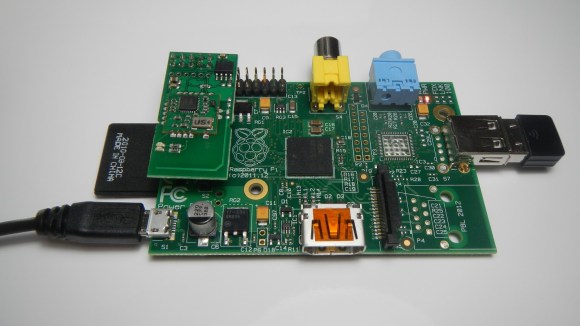
Home automation keeps popping up here at Hackaday, so [Cristian Zatonyl] decided to share his Raspberry Pi-based system with us. This build takes a firm stance on the “automated” side of the automation vs. control debate we had last week: no user input necessary. Instead, [Cristian] relies on geofencing to detect whether he has driven outside the set radius and automatically turns off the lights and locks his door.
The build takes advantage of Z-Wave products, which are your typical wireless remote-control gadgets, but tacks on a third-party “RaZberry” board to a Raspi to give it control over off-the-shelf Z-wave devices. The final step is the integration of a custom iOS app that keeps tabs on the geofence boundaries and signals the Pi to control the lights and the front door lock.
[Cristian’s] tutorial covers the basics and admits that it’s a proof of concept without any security features. Judging by his other YouTube videos, however, we’re sure more developments are underway. Check out the video below for a demonstration of the system, then feel free to speculate on security concerns in the comments. Our article on Z-wave security from a few years ago might be a good starting point.















I wish someone would make a sam kind of geofencing app for android. My skils aren’t enough..
http://developer.android.com/training/location/geofencing.html
Information at the power of your hands.
Tasker
Thanks for this! :) I just made some tasks to contoll my webiopi home automation.
I’m trying to set up a task to send an http post to my webiopi setup, but I’m getting an error. I think it might have to do with the fact that the webiopi has a user name and password. How did you get it to work?
Considering home security is an illusion I don’t think geo-fencing is the best security practice. I would rather people see me locking my house to indicate that there is a lock and it is set. With this system, even if the door is locked, if a criminals interest is piqued enough to come near the door you have lost.
I totally agree, just like security cameras they are there to “keep” the criminals out and not catch them.
People get caught due to security cameras all the time. What the hell are you talking about?
Home security is NOT an illusion when you catch your cat-sitter in the act of stealing
Home Security isn’t an illusion – the door lock as a secure mechanism is an illusion. Especially so if the door is next to the glass window.
Secure your house and it will be secure. House security is the same compromise with any security – it can be secure, or it can be convenient/cheap/aesthetically pleasing.
the illusion is thinking something can be 100% secure, nothing is 100% secure, if you want to gain access to something you will. Be that a computer system or a house in this matter, it doesnt matter what messures you put in place they can all be broken with time ;)
Crazy uncle armed with an AR-15 and 5000 rounds is 100% secure. Problem is it’s also secure against me, he shoots at least 10 rounds at any noise… Wife and I have been living in the car for 3 days in hopes he will run out of ammo or food soon.
and if i have an AR-15 with 6000 rounds then he isnt, i can wait out his 5000 shots and still have 1000 to spare that is if we go shot for shot, so it still stands nothing is 100% secure
sniper riffle defeats this system before he even knows about it.
So are you suggesting we do nothing then?
no not at all, im just saying nothing is 100% secure. The statment was “Security isn’t an illusion”, but if you think you are 100% secure and nothing can get past your security then you start to lapse. All im saying is if someone wants to gain access to what ever it is regardless of what you have done they will find away. Lets take a house as an example because that is what we are talking about, lets say you put bars on every winder the door has a state of the art lock that is really hard to pick, there are still two entry points, one the door, depending on your skills you might be able to pick the lock, i mean you can always walk up to the front door have a look at what lock it is then go out and buy the same lock and work out how to pick it. The bars on the window one can simply take an angle grider to them in order to cut the bars, or a blow torch. Then you can break the window. Now lets say you couldnt pick the lock. There is nothing stoping you from driving a car through the front of the house, or a small bomb to blow the door off. The point im making here is that if you really wanted to gain access to something you will find away regardless of what has been done to secure it… We can apply the same thing to computers, lets take the new iPhone as an example with its finger print scanner, apple is saying and so is the media that it is the most secure phone on the market as the only way to unlock the phone is with the person finger, now i would assume everyone that reads hackaday knows that that statement is a load of shit and that it is very easy to get around the finger print scanner. The point im trying to make with the iPhone here is that apple and the media are trying to build an illusion that the iPhone is secure, when in actuall fact it is no more secure then what it use to be, if anything it is now less secure, as that phone is covered with the finger print that is needed in order to unlock it ;)
if you go on Safari with a mate to be safe you don’t need to run faster than a lion, you need to run faster than him.
Security isn’t about 100% absolute security, it’s about making your house more secure than your neighbour.
@Spider
Paragraph breaks are your friend.
@dan
It’s also about making forced entry as time consuming as possible to mess up the risk/reward calculation. Even if a house is the low-hanging fruit, if it’s a big enough pain to break into and doesn’t have, like, diamond studded stereo equipment facing the front windows most thieves will just find a different street because fuck that noise.
Great project! I like seeing folks select a Pi for a worthy task.
I also built a solution that uses geofencing, but I only use it to control the thermostat. For the security risks implied in the threads above, I’m not yet ready to give any kind of autonomous control of door locks just yet.
I tried to build my own using some GPS software for Android phones, but after many failed attempts, I ultimately ended up just using long-range Xbee radios.
http://bithead942.wordpress.com/watchdog-feature-summary/
The issue I see with geofencing unlocking doors (or any automatic unlock system), is that too often, it’s controlled by something you have, rather than something you know + something you have.
For instance, I have an alarm system in the house. I have a keyfob that can open and close the garage door. It can also *arm* the system, but not disarm it. That way, if someone steals my car (here’s hoping!) they can open the garage door, but they have a very short time to disarm the system via the keypad. To leave, I open the garage door, arm the system, pull out, then close the garage door. All most all the convenience, but with a reasonable degree of security (caveats as per above. Anything can be gotten into, given enough time, money and opportunity).
There’s a good reason you don’t leave documents in your car with your address on them. Insurance card and registration should be kept in your wallet or purse, or better yet, a digitized copy on your phone (most states accept that as proof).
Working for a large multi-national company that manufacturers door locks that are WiFi and Ethernet-based, which support PINs, mag cards, 125KHz Prox, 13.56MHz RFID and NFC-type credentials, I’m very aware of network, device and premises security issues. While I grant that a typical cylinder lock can be bumped in a second or two, I still don’t trust electronic door locks. I’d rather someone had to be on-premises to crack my locks, rather than half-a-block away, sitting in a car, spending an hour breaking in. Someone on-premises is more likely to be noticed, caught by the cameras, and eaten by two 85lb German Shepherds.
I agree about expecting someone to be on-site to operate the lock, but the convenience of at least a numeric keypad to allow keyless entry is a good compromise in my opinion. I early adopted the first Schalge Z-Wave lock, which is operable via keyed-in code, Z-Wave command, or standard key. It doesn’t offer a motorized throw of a deadbolt or RFID/NFC/Bluetooth so there is no chance you’ll “fat finger” the app accidentally or misjudge your geofence and accidentally leave your door unlocked as you leave. You have to manually turn the bolt (on the deadbolt version of the lock), and you are only given a few second window to do it. Seems to be the best of both sides, but unfortunately the Schalge manual keypad lock is gone as everyone is moving toward proximity triggers and motorized bolts. Then again we grew to trust automatic garage door openers, but the geofencing isn’t realistically useful and would ruin a surprise party in your honor.
I don’t have a problem with keypads, since that’s a “something you know”. If just a mag card or Prox card is used without a PIN, then it’s just “something you have”. And mag cards and 125KHz Prox cards are trivial to clone. The 13.56MHz technologies are a little more secure, but it’s not until you start using DESFire and SEOS-based cards do the cards become uncompromisable (as of now). However, without the “something you know” part, anyone with your card can walk through any door. That’s the part I don’t like.